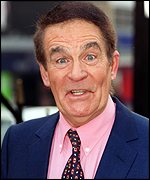Ted Rogers
(→Biography: +comment) |
|||
| Line 1: | Line 1: | ||
| - | <div class="image"> | + | <div class="image">[[File:Rogers ted smile.jpg]]</div> |
<div class="box"> | <div class="box"> | ||
| + | |||
== Shows == | == Shows == | ||
| Line 7: | Line 8: | ||
</div> | </div> | ||
| + | |||
== Biography == | == Biography == | ||
Current revision as of 23:28, 23 April 2017
Biography
Londoner by birth, he began as an impressionist. He started with Danny Kaye sound-a-likes, before branching out to rock and roll stars. He introduced the last few weeks of Sunday Night At the London Palladium (see Forsyth, Bruce), which led to further compere jobs.
Most of his later stand-up material revolved around the economic crises of the 1970s (a period of British history characterised by strikes). It was written with Wally Malston, who wrote most of Ted's material for 3-2-1.
Like a lot of people in the 80s, some bad investments lost him a lot of money, but he later enjoyed a revival thanks to a series of adverts for McDonalds.
He died in May 2001, after being treated for an irregular heartbeat condition. His final on-screen role, broadcast in January of that year, saw him playing a corrupt game show host in an episode of ChuckleVision.
Trivia
He used to play polo regularly at Cowdray Park.
He appears in the famous 1980s advert for the biscuit 54321, looking perplexed as even his rubber fingers can't cope with the pace:


